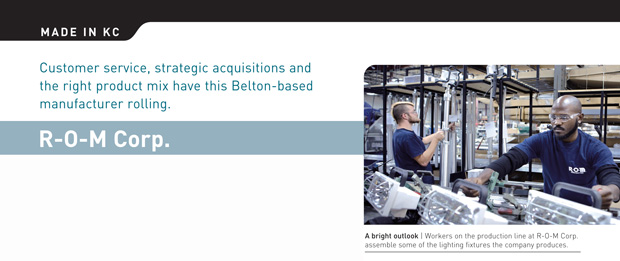If you really want to appreciate the depth of the economic downturn in this country, try making products for other businesses. Jeff Hupke does, and as president of R-O-M Corp., he has a box seat to keep score on the economic recovery.
Belton-based R-O-M’s line includes such equipment as roll-up doors for emergency and food-distribution vehicles, along with other products that safeguard workers in the business of moving heavy loads—ramps, cargo trays, LED lighting and more. One of the company’s sweet spots historically has been the truck and trailer industry, which offers some metrics into that contest he’s observing.
“When the recession hit, the trailer build in the U.S. went from 300,000, one of the highest levels all-time, to about 78,000,” Hupke said. “For us, the impact wasn’t that great because our primary customers in the truck and trailer market were food-service distributors, and the food service segment was much less elastic.”
Indeed, people have to eat in bad times or good. But R-O-M also weathered the downturn by blending a renewed focus on customer service with strategic acquisitions, and by relying on an industry segment that operates on a different economic cycle: Fire-truck and emergency-vehicles.
“The fire side lags the general economy by about two years,” Hupke said. “Fire trucks are based on municipal spending and property taxes,” which held up through the first phase of the downturn. “That helped carry us through,” he said.
Change of Direction
Now, the field is reversing. “With municipal spending and their tight budgets, there’s a capital spending pullback,” Hupke said. “They buy less, they buy smaller.” The effect has been a fire-equipment equivalent to the trailer downturn: “Two years ago, there were 6,000 fire trucks sold in North America, and in a normal year, it’s about 5,400,” Hupke said. “This year, it’s about 4,000.”
Fortunate then, as he notes, that there are signs of recovery on the truck and trailer side. But then, there had to be: The equipment made by R-O-M gets worked hard. Even with the best of maintenance, it will eventually have to be replaced.
To ensure a steady stream of the parts needed for that, R-O-M has been strengthening itself, in part by buying one of its biggest competitors. The most recent was September’s acquisition of Bustin Industrial Products, based in East Stroudsburg, Pa. The acquisition, Hupke said, was part of a strategy devised with the equity firm that owns R-O-M, which was founded in Downtown Kansas City in 1947.
While not the easiest fit geographically, the Bustin acquisition bolstered the numbers of engineers and outside sales staff needed to meet client expectations. “They had different products, but the core philosophy was the same,” Hupke said. “Bustin had a number of products in the market that we didn’t have that accented our product lines, giving us a chance to provide better service and a more diverse product portfolio to customers.”
With 175 employees overall, and running a full shift out of each site and a partial second shift in Belton, Hupke says the company is well-positioned to continue its growth, both organic and through additional acquisitions as opportunities arise.
Operating out of the nation’s midsection has given R-O-M an operational advantage, Hupke notes, as has the quality of the work force in Kansas City. “Our philosophy has been to remain conservative and not over-hire.” But when he does hire, he finds people with “a good work ethic, and people embrace the team concept,” Hupke said. The region’s work ethic, he noted, benefits R-O-M in other ways.
“One of the cool things about Kansas City is that it is a medium-sized city that has a lot of the characteristics of a big city,” he said. “It means you don’t have the super-high costs associated with different types of partnerships you see on the coasts, and a very, very high value for other partnerships—legal, insurance brokerage, accounting firms—the folks here are second to none.”
By not having to pay the extraordinary costs of the cities nearer the coasts, he said, “you get a lot of value for your dollar with that Midwestern work ethic. The relationships we have with those kinds of partnerships have been great for us to continue to grow.” ![]()
